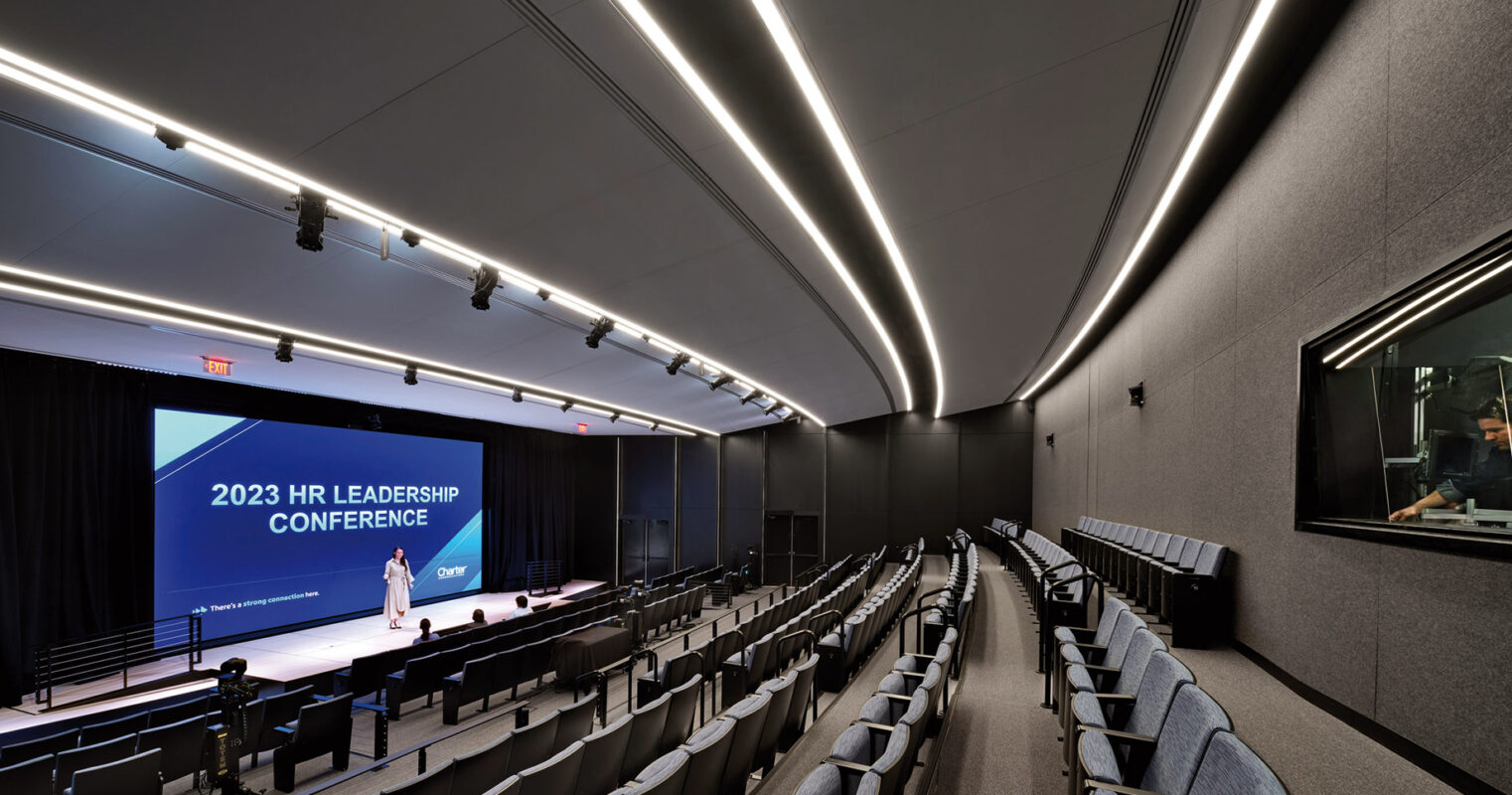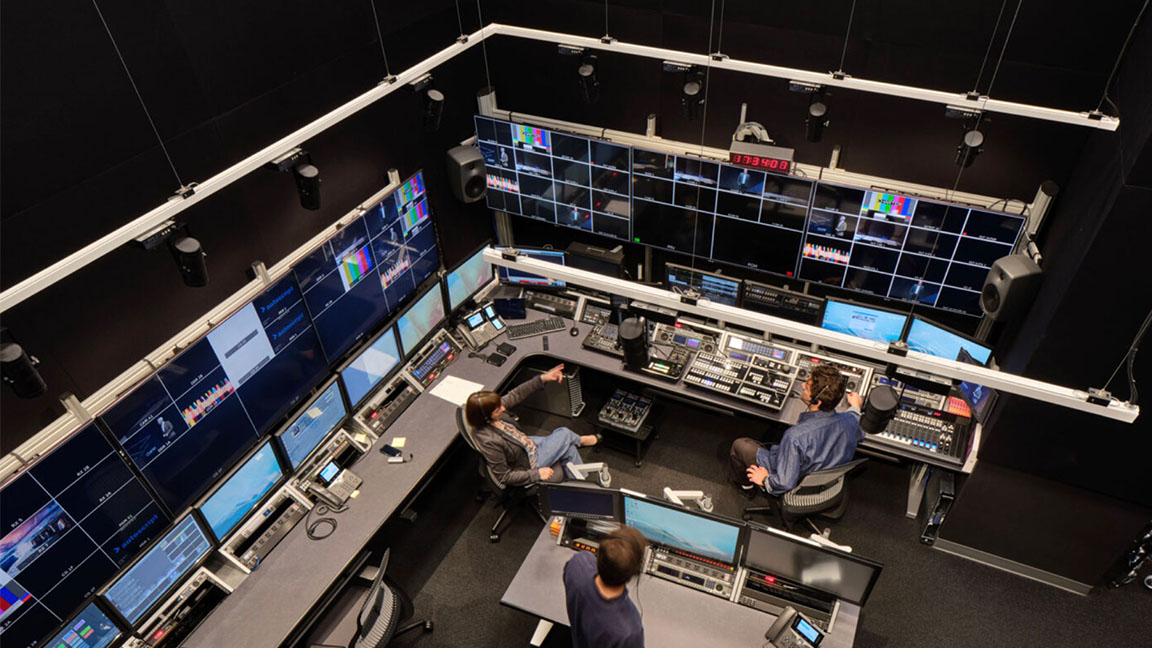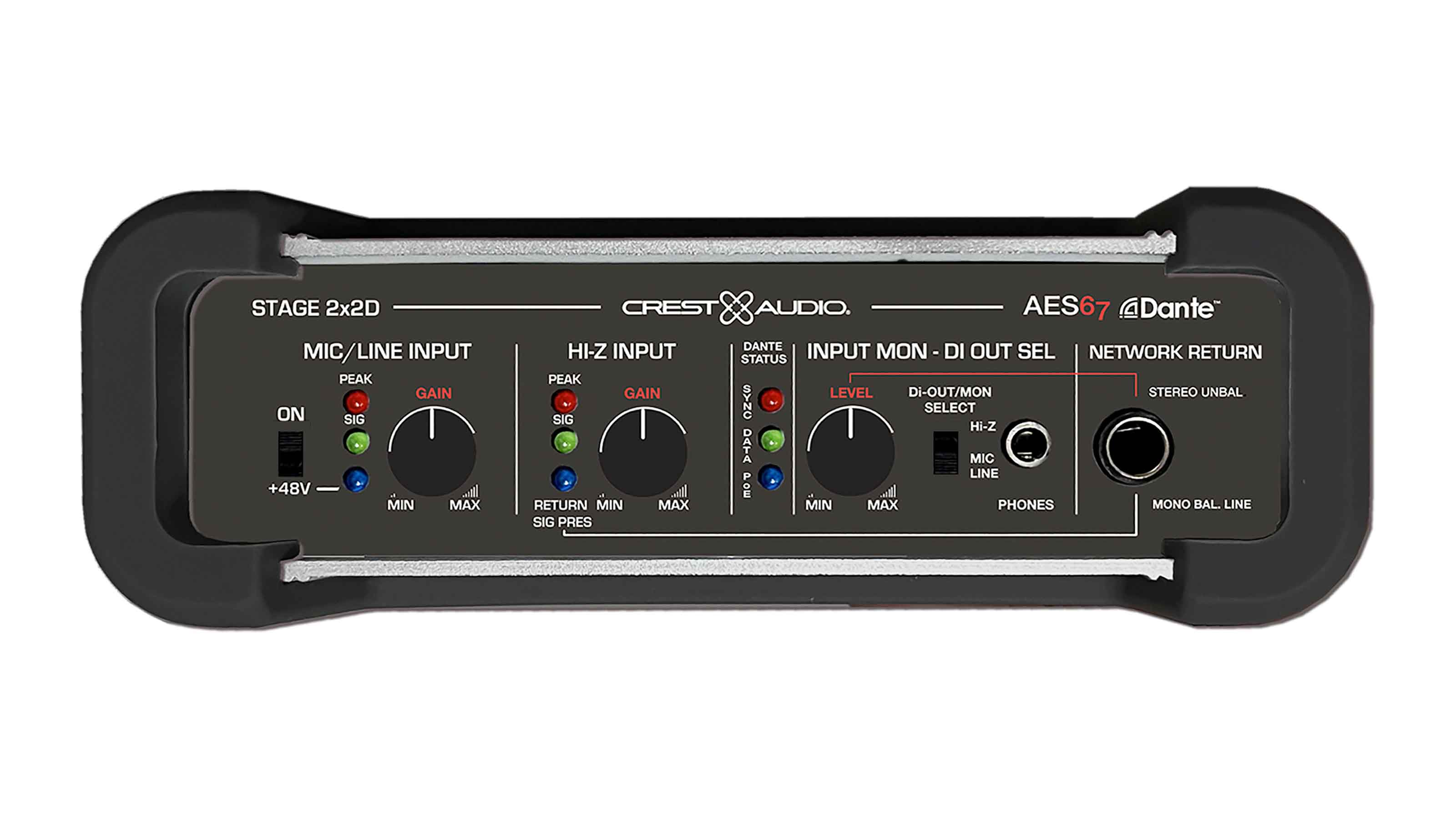Corporate Connectivity
Charter Communications has outfitted its auditorium with broadcast-quality technology.

Stamford, CT, may be known as "The City That Works," but the downtown headquarters for Charter Communications and its new 250-seat auditorium space may just be known as "The HQ That Connects." Part of the latest phase of developing its innovative campus, which opened in 2022, the auditorium is positioned to be the next evolution of a campus centered around collaboration, flexibility, and innovation.
[Strategies and Solutions for Corporate Campus Displays]
Addressing the changing landscape of hybrid work while offering multi-use spaces for events, town hall meetings, and companywide presentations, the auditorium is predicated on ease of use and consistency. What sets it apart is its high-caliber broadcasting for remote capabilities, a feature that is sure to impress. With a build and integration that took about eight months from the start of construction through completion, Charter collaborated with architecture firm HLW and technology integrator Diversified to deliver a highly utilized space with high-level broadcast capabilities.
Independent Infrastructures
Integrating advanced technology within a sophisticated design, the larger scope of the project included typical AV and broadcast production components while dealing with specialty components, including an auditorium wrapper and an interactive fountain in the adjacent courtyard. “Each of these systems had independent infrastructure requirements and phasing needs which had to be resolved within tight assemblies and minimal footprints,” said Jeremiah Hancock, associate principal, studio director CT, media & entertainment lead, HLW.
Central to the visual capabilities of the space is a 12x20-foot Planar video wall that delivers HD video presentations and offers adequate viewing no matter where you are seated within the auditorium space. “While typical conference rooms incorporate architectural detailing to accommodate the inevitable change in screen sizes over the life of the fit-out, the auditorium design strived for a more integrated and refined aesthetic aligning with its more prominent use case,” said Hancock.
The JBL audio system was designed to deliver clear and impactful audio for various events. The network includes JBL PSB-1 soundbars placed on each side of the video wall and connected to the HDMI matrix for high-quality audio output. Custom-configured amplifiers are integrated to provide adequate power and control for the speakers. Advanced audio processors ensure optimal sound quality and distribution, and provide the flexibility to meet a wide range of event requirements while supporting multiple audio formats.

The entire system is housed and organized in a rack system that allows all necessary components for signal distribution and control to be housed in one optimal location. It was ensured that the auditorium would be located away from the perimeter glass of the building due to its proximity to the local train station, helping the team limit any acoustical challenges that may have been caused.
A daily selection of the top stories for AV integrators, resellers and consultants. Sign up below.
Lights and Mics
The space includes a combination of architectural and theatrical lighting on the interior, while dynamic, decorative lighting is incorporated into the "wrapper" that encloses the suite of spaces, along with soft glowing details within the stairs and walls for greater visibility. The lowest portion of the wrapper is clad in marble and includes seamless detailing of the infographic displays near the auditorium entrance, along with a mesh ceiling stretching down to meet the floor.
"The lighting design includes a complex open cell ceiling system with over 1,900 LED nodes and 20-foot vertical RGB LED strips integrated into the auditorium's architectural wrapper," added Hancock. "This setup allows for dynamic lighting effects that can be synchronized with media content for a fully immersive experience."
The architectural lighting features continuous linear pendants designed to follow the curve of the ceiling openings. The theatrical stage lighting comprises two rows of alternating ETC Source 4 key, ETC Desire wash lights, and an ETC ColorSource Linear backlight row on the stage, enhancing visibility for performers.
Martin VC-Strip LED video strips with a 15mm pixel pitch were used for the lighting system, and Color Kinetic FlexElite IntelliHue fixtures were integrated for the ceiling nodes. P3 system controllers manage the LED and lighting fixtures, delivering synchronized operation and real-time control. The system also allows for the integration of video and lighting controls through a unified platform, supporting both DMX and Art-Net protocols.
With a wide range of speaking and presentation scenarios planned for the auditorium space, the microphone system included wireless mics for mobility as well as handheld and lavalier mics to accommodate all speaking preferences, ensuring a clear audio presentation no matter where the presenter was located. The microphone network is managed through an integrated control system, including signal processing and feedback prevention, ensuring seamless integration with the room's more extensive audio setup.
Versatile audio options, combined with simplified docking and content sharing, make the spaces more universally accessible. “These components together create a comprehensive audio system that supports high-quality sound reinforcement for any event held in the auditorium,” said Michael Branca, project manager with Diversified.
Local and Remote Control

After careful consideration with internal subject matter experts across the Spectrum team, Charter identified the need for an on-site production studio and control room to enhance the auditorium space's production capabilities, helping to record and deliver company-wide messages and announcements along with other Spectrum branded content. “While the facility does not have the redundancy typical of a television broadcast studio, it packs all of the capabilities into a creatively packaged suite of spaces, set within a larger pre-function and event space at the ground floor of their campus,” Hancock explained.
Due to their complexity, a specialty team manages the auditorium and studio control systems. Still, presets are available to the end user to facilitate the use of basic WebEx and content sharing capabilities. The internal, on-site team manages any needs for planned large-scale events.
The Crestron CP3N control system manages the auditorium, 50 conference rooms across 15 floors, and a conference center on the plaza level. Charter’s internal IT services department can operate the system locally through touchpanels at the AV equipment racks and within the auditorium, while having the ability to manage remotely via web interfaces. Supported by a private, isolated IP network, it can issue alerts and failover commands, and the backend hardware is protected by a UPS system, ensuring reliability and high availability during all events.
“This system provides a dedicated Control Subnet, allowing for seamless control and management of all connected devices. It supports a variety of communication protocols, including Ethernet, Cresnet, and USB, and allows for real-time multitasking and modular programming,” said Travis Heitchew, enterprise program manager with Diversified.
Even though the partners said the new auditorium space is open to continuous evolution, especially concerning lighting, the space as currently outfitted has accomplished everything Charter hoped for, fitting in seamlessly within other work areas within its headquarters. “The auditorium space has been successfully received and is highly utilized by many teams across the headquarters population,” added Hancock.
Jennifer is a freelance writer and marketing consultant based in the New York City area. Within the AV industry, Jennifer loves to explore how technology can alter the world around us, creating immersive experiences unlike any other. She has years of experience working with AV integrators, manufacturers, and event production companies in developing engaging content to increase their overall awareness.

